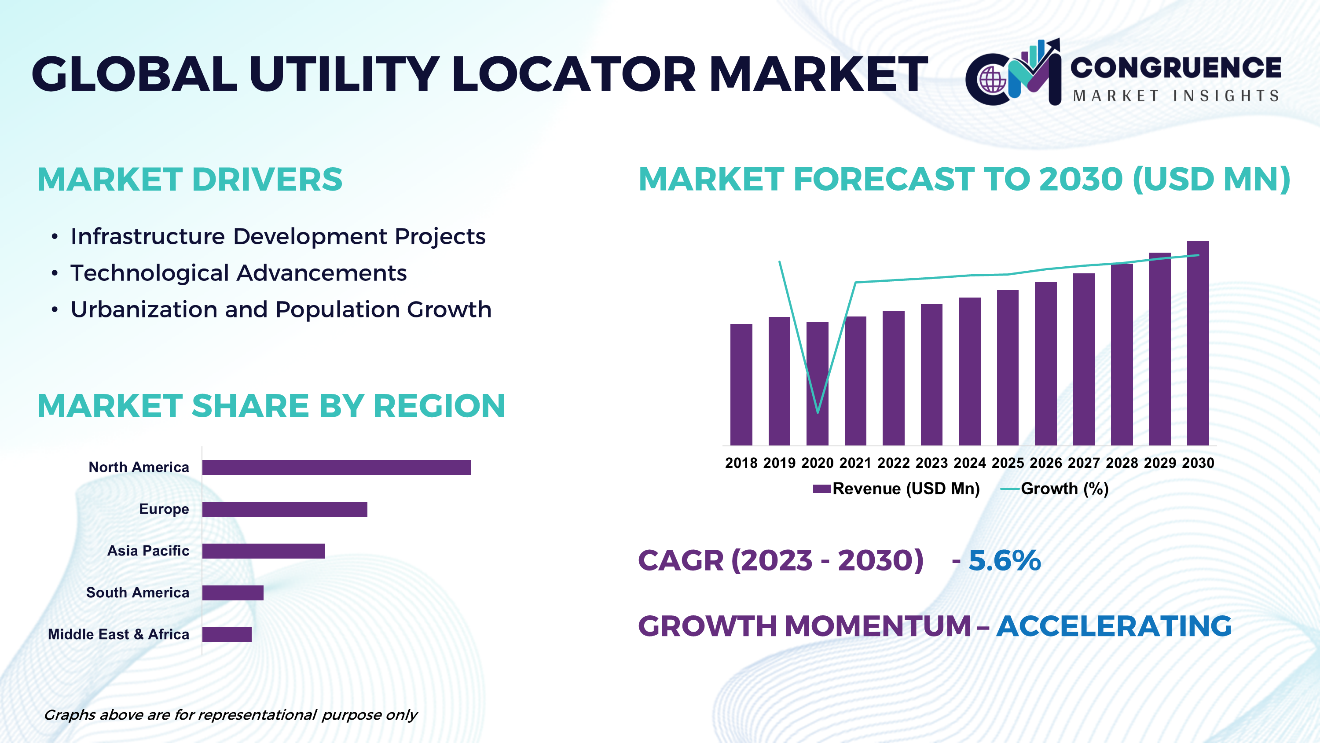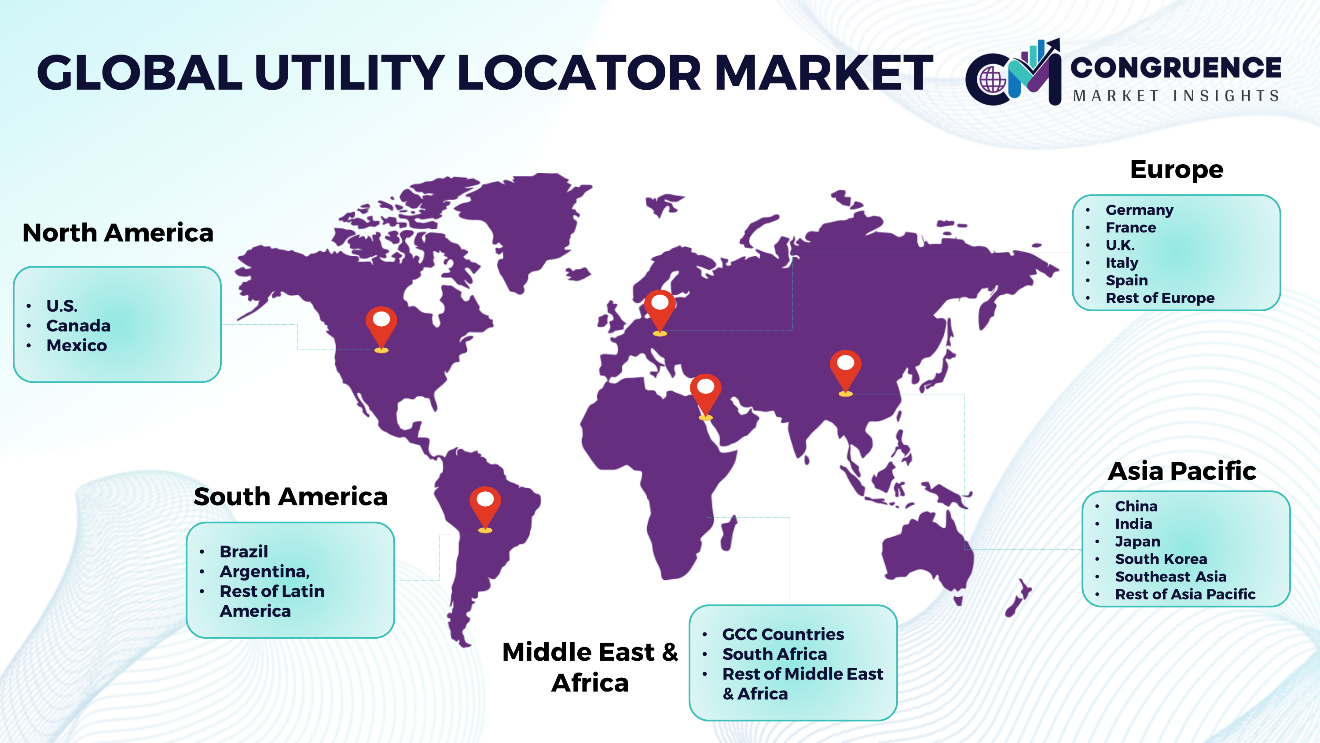Reports
The Global Utility Locator Market is expected to expand at a CAGR of 5.6% between 2023 and 2030. Utility locators are essential instruments in guaranteeing the secure excavation of subterranean infrastructure, covering gas, water, electricity, and telecommunication networks. Their precise operation is critical in averting damage and potential hazards, rendering them indispensable in varied sectors like construction, landscaping, and municipal services. Technological progressions have driven the evolution of sophisticated locators incorporating advanced sensors and GPS functionalities, markedly amplifying precision and operational effectiveness.

Utility Locator Market Major Driving Forces
Infrastructure Development Projects: Increasing investments in infrastructure development, including construction, renovation, and maintenance of utilities such as gas pipelines, water mains, and electrical networks, drive the demand for utility locators.
Technological Advancements: Ongoing advancements in sensor technology, GPS integration, and data analytics enhance the accuracy, efficiency, and capabilities of utility locators, driving market growth.
Urbanization and Population Growth: Rapid urbanization and population expansion lead to higher demand for utilities, necessitating the need for efficient and precise utility locator solutions to support infrastructure expansion and maintenance.
Utility Locator Market Key Opportunities
Expansion in Emerging Markets: Emerging economies witnessing rapid urbanization and infrastructure development offer promising prospects for utility locator providers to penetrate new markets and meet escalating demand for underground utility detection solutions.
Integration of Advanced Technologies: There is considerable potential to incorporate cutting-edge technologies such as artificial intelligence, machine learning, and augmented reality into utility locator systems, enhancing accuracy, efficiency, and user experience.
Diversification of Applications: Utility locators can extend their applications beyond conventional sectors like construction and landscaping to industries such as agriculture, environmental monitoring, and disaster response, presenting avenues for diversification and market expansion.
Utility Locator Market Key Trends
· Advanced technologies such as artificial intelligence, machine learning, and augmented reality are increasingly integrated into utility locator systems, enhancing accuracy and user experience.
· Utility locators are finding applications beyond traditional sectors like construction and landscaping, expanding into industries such as agriculture, environmental monitoring, and disaster response.
· The preference for non-invasive utility locating methods, such as ground-penetrating radar (GPR) and electromagnetic induction (EMI) technologies, is growing to minimize disruption and damage to underground infrastructure.
· Utility locator systems are incorporating data integration and analytics capabilities to provide actionable insights, streamline workflows, and improve decision-making processes.
· There is a notable emphasis on sustainability within the utility locator market, with manufacturers and users focusing on eco-friendly equipment, reduced energy consumption, and minimizing environmental impact.

Market Competition Landscape
In the utility locator market, competition among manufacturers is robust, driven by a pursuit of innovation, quality, and cost-efficiency. Companies are dedicated to refining their offerings to meet the evolving demands of the industry. Key competitive factors encompass technological advancements, precision, reliability, and customer service. Furthermore, adherence to regulatory standards and global market penetration are pivotal determinants of competitive advantage in this dynamic landscape.
Key players in the global Utility Locator market implement various organic and inorganic strategies to strengthen and improve their market positioning. Prominent players in the market include:
· ABB Ltd.
· Siemens AG
· Eaton Corporation
· Schneider Electric SE
· General Electric Company
· Toshiba Corporation
· Mitsubishi Electric Corporation
· Crompton Greaves Ltd. (CG Power)
· Larsen & Toubro Limited (L&T)
· Powell Industries Inc.
· Hubbell Incorporated
· NOJA Power
· TE Connectivity Ltd.
· Schweitzer Engineering Laboratories
· S&C Electric Company
· G&W Electric Company
· Hitachi Ltd.
· Lucy Electric
· Maschinenfabrik Reinhausen GmbH
|
Report Attribute/Metric |
Details |
|
Base Year |
2022 |
|
Forecast Period |
2023 – 2030 |
|
Historical Data |
2018 to 2022 |
|
Forecast Unit |
Value (US$ Mn) |
|
Key Report Deliverable |
Revenue Forecast, Growth Trends, Market Dynamics, Segmental Overview, Regional and Country-wise Analysis, Competition Landscape |
|
Segments Covered |
· By Technology Type (Ground penetrating radar (GPR), electromagnetic induction (EMI), GPS/GNSS, Acoustic pipe locator, and Others) · By Utility Type (Electric, Water, Gas, and others) · By Application (Residential, Commercial, and Industrial) · By End-User (Contractors, Construction Companies, Utility Companies, and Others) |
|
Geographies Covered |
North America: U.S., Canada and Mexico Europe: Germany, France, U.K., Italy, Spain, and Rest of Europe Asia Pacific: China, India, Japan, South Korea, Southeast Asia, and Rest of Asia Pacific South America: Brazil, Argentina, and Rest of Latin America Middle East & Africa: GCC Countries, South Africa, and Rest of Middle East & Africa |
|
Key Players Analyzed |
ABB Ltd., Siemens AG, Eaton Corporation, Schneider Electric SE, General Electric, Toshiba Corporation, Mitsubishi Electric Corporation, Crompton Greaves Ltd. (CG Power), Larsen & Toubro Limited (L&T), Powell Industries Inc., Hubbell Incorporated, NOJA Power, TE Connectivity Ltd., SEL (Schweitzer Engineering Laboratories), S&C Electric Company, G&W Electric Company, Hitachi Ltd., Lucy Electric, Maschinenfabrik Reinhausen GmbH (MR) |
|
Customization & Pricing |
Available on Request (10% Customization is Free) |
